|
|
|
Sort Order |
|
|
|
Items / Page
|
|
|
|
|
|
|
| Srl | Item |
| 1 |
ID:
103720
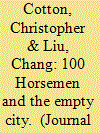

|
|
|
|
|
| Publication |
2011.
|
| Summary/Abstract |
We present game theoretic models of two of the most famous military bluffs from history. These include the legend of Li Guang and his 100 horsemen (144 BC), and the legend of Zhuge Liang and the Empty City (228 AD). In both legends, the military commander faces a much stronger opposing army, but instead of ordering his men to retreat, he orders them to act in a manner consistent with baiting the enemy into an ambush. The stronger opposing army, uncertain whether it is facing a weak opponent or an ambush, then decides to flee and avoid battle. Military scholars refer to both stories to illustrate the importance of deception in warfare, often highlighting the creativity of the generals' strategies. We model both situations as signaling games in which the opponent is uncertain whether the general is weak (i.e. has few soldiers) or strong (i.e. has a larger army waiting to ambush his opponent if they engage in combat). We then derive the unique Perfect Bayesian Equilibrium of the games. When the probability of a weak general is high enough, the equilibrium involves mixed strategies, with weak generals sometimes fleeing and sometimes bluffing about their strength. The equilibrium always involves the generals and their opponents acting as they did in the historical examples with at least a positive probability. When the probability of a weak general is lower (which is reasonable given the reputations of Li Guang and Zhuge Liang), then the unique equilibrium always involves bluffing by the general and retreat by his opponent.
|
|
|
|
|
|
|
|
|
|
|
|
|
|
|
|
| 2 |
ID:
110803
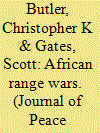

|
|
|
|
|
| Publication |
2012.
|
| Summary/Abstract |
This article examines the effect of climate change on a type of armed conflict that pits pastoralists (cattle herders) against each other (range wars). Such conflicts are typically fought over water rights and/or grazing rights to unfenced/unowned land. The state is rarely involved directly. The rangeland of East Africa is a region particularly vulnerable to drought and livestock diseases associated with climate change. To analyze the possible effects of climate change on pastoral conflict, we focus our analysis on changes in resource availability, contrasting cases of abundance and scarcity. The role of resources is further contextualized by competing notions of property rights, and the role of the state in defining property and associated rights. We employ a contest success function (CSF) game-theoretic model to analyze the logic of range wars. This CSF approach emphasizes the low-level, non-binary nature of raiding behavior between pastoralist groups over limited natural resources. A central contribution of this approach is that the logic of raiding behavior implies a positive relationship between resources and conflict. This positive relationship is supported by several studies of the rangeland of East Africa, but is generally dismissed by the literature on the 'resource curse'. This relationship is contingent on other factors examined in the model, producing the following results. First, the level of property rights protection provided by the state generally reduces conflict between pastoralist groups. Second, if property rights protection is provided in a biased manner, then conflict between pastoralist groups increases. Third, severe resource asymmetries between two pastoralist groups will induce the poorer group to become bandits (focusing their efforts on raiding and not producing), while the richer group raids in retaliation.
|
|
|
|
|
|
|
|
|
|
|
|
|
|
|
|
| 3 |
ID:
189959
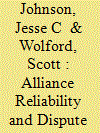

|
|
|
|
|
| Summary/Abstract |
States form defensive alliances hoping to deter adversaries and avoid war. However, scholars and policy analysts often worry that if an alliance fails to deter the promise of military support will encourage escalation, pushing disputants closer to war. We show that in many cases this concern is unwarranted. We use a game-theoretic model of alliance reliability and crisis bargaining to show that the same factors that indicate unreliability and provoke disputes also encourage alliance members to make concessions rather than risk war. We test this hypothesis using a sample of militarized disputes initiated against members of defensive alliances, where recent shifts in military capabilities represent changes in challengers’ estimates of alliance reliability. Less-reliable alliances are less likely than reliable allies to deter disputes, but they also decrease the probability of escalation relative to reliable alliances. Unreliable alliances need not encourage war; rather, they can discourage it.
|
|
|
|
|
|
|
|
|
|
|
|
|
|
|
|
| 4 |
ID:
149898
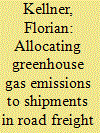

|
|
|
|
|
| Summary/Abstract |
The European Norm EN 16258 was published in 2012 to provide a common methodology for the calculation and declaration of energy consumption and greenhouse gas emissions related to any transport operation. The objective was to offer a pragmatic and scientifically-acceptable approach that allows a wide group of users to prepare standardized, accurate, credible, comparable, and verifiable energy consumption and emission declarations. However, in its current form, EN 16258 contains gaps and ambiguities, and leaves room for interpretation, which makes comparisons of supply chains difficult. This research aims to overcome the shortcomings in the domain of allocating emissions from road freight transport operations to single shipments. Based on a discussion of emission drivers and the results of numerical experiments comparing the allocation vectors created by the EN 16258 allocation rules with those generated by the Shapley value, which is claimed to be the benchmark, ‘distance’ is identified as the single most useful unit for bridging the trade-off between accuracy and simplicity better than the other recommended allocation schemes. Thus, this paper claims that future versions of EN 16258 should only allow the allocation unit ‘distance.’ This will promote the accurateness, simplicity, consistency, transparency, and comparability of emission declarations.
|
|
|
|
|
|
|
|
|
|
|
|
|
|
|
|
| 5 |
ID:
128871


|
|
|
|
|
| Publication |
2014.
|
| Summary/Abstract |
This article presents an eclectic review of the analytical study of terrorism that views all agents as rational decisionmakers. This analytical literature began in earnest with the seminal study of US skyjackings by William Landes in 1978. After 11 September 2001, the analytical literature on terrorism grew rapidly. Based on policy relevance, my survey article identifies five key areas of intense research interests. These include analyses of terrorist attack trends, the economic consequences of terrorism, the study of counterterrorism effectiveness, the causes of terrorism, and the relationship of terrorism and liberal democracies. New developments in the field focused on distinguishing key differences between domestic and transnational terrorism. Additionally, recent game-theoretic advances permitted more active agents and stages to the games. Other major developments involved the study of networked terrorists and the role of counterterrorism foreign aid. Fruitful future directions include using advanced econometric methods to discern the true impact of terrorism on growth, applying spatial econometrics to the study of terrorism, ascertaining the determinants of terrorist groups' longevity, and learning how to foster international counterterrorism cooperation.
|
|
|
|
|
|
|
|
|
|
|
|
|
|
|
|
| 6 |
ID:
005056
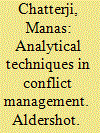

|
|
|
|
|
| Publication |
Aldershot, Dartmouth Pub., 1992.
|
| Description |
vii, 390p.; figures and tables
|
| Standard Number |
1855212218
|
|
|
|
|
|
|
|
|
|
|
|
Copies: C:1/I:0,R:0,Q:0
Circulation
| Accession# | Call# | Current Location | Status | Policy | Location |
| 036227 | 303.69/CHA 036227 | Main | On Shelf | General | |
|
|
|
|
| 7 |
ID:
178326
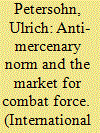

|
|
|
|
|
| Summary/Abstract |
Since 2013, combat services have been increasingly exchanged on the market. This development is puzzling since the practice emerged despite an anti-mercenary norm banning such services, and without any revision of the norm. The article argues that the combat market is not a deliberate design, but the result of strategic interaction. For some, compliance with the anti-mercenary norm is the best strategy, while for others, violating the norm is best. However, once the norm violation occurs, it is in the interest of all actors to maintain a façade of compliance. Non-compliant actors benefit from the combat services, and compliant actors do not have to engage in costly sanctioning of the norm violation, and avoid the reputational costs associated with non-enforcement. The article employs game theory to investigate the strategic interactions of actors across eleven combat contracts from 2013 to 2019.
|
|
|
|
|
|
|
|
|
|
|
|
|
|
|
|
| 8 |
ID:
078494
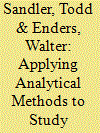

|
|
|
|
|
| Publication |
2007.
|
| Summary/Abstract |
This paper presents a perspective on the application of theoretical and empirical methods to the study of domestic and transnational terrorism. The use of such methods can lead to informed policy making. On the theoretical side, both choice-theoretic and game-theoretic methods are examined. For empirical applications, the paper focuses on the study of trend, cycles, and forecasting. Additionally, the use of intervention analysis in various forms is reviewed with to regards to evaluating policy effectiveness and quantifying the economic impact of terrorism. Although this paper is not intended as a literature review, some key studies are highlighted for readers to pursue in greater depth
|
|
|
|
|
|
|
|
|
|
|
|
|
|
|
|
| 9 |
ID:
111215
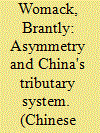

|
|
|
|
|
| Publication |
2012.
|
| Summary/Abstract |
In his article, 'Equilibrium Analysis of the Tributary System', Zhou Fangyin presents an important and stimulating application of the game theory of patterns of interaction to China's traditional diplomacy with its neighbors.1 His analysis contradicts the realist expectation that the larger power would simply dominate smaller powers in the context of international anarchy. However, his explanation of the tributary system does not rely on a cultural explanation based on Confucian morality, but rather on processes of conflictual interaction that lead to mutual accommodation between China and its neighbors.
Zhou rightly emphasizes the two-way character of the tributary system and the centrality of its basic idea for Chinese diplomacy. In contrast to John Fairbank, he argues that it is more than a diplomatic cover for a trade relationship. In contrast to the general assumption that tribute is a form of booty that a larger power requires from a smaller power, he emphasizes China's primary interest in stabilizing its relationships with neighbors through concessions. Indeed, it appears from Zhou's narration that China is at the disadvantaged side of tributary relationships: frustrated in conflicts and conceding to neighbors in order to pacify its borders. By providing a clear and plausible model for interaction and interesting, complex cases of processes through which to arrive at equilibrium, Zhou has, indeed, made a contribution to both theory and history.
|
|
|
|
|
|
|
|
|
|
|
|
|
|
|
|
| 10 |
ID:
120643
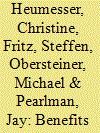

|
|
|
|
|
| Publication |
2012.
|
| Summary/Abstract |
The vision of the Global Earth Observation System of Systems (GEOSS) is the achievement of societal benefits through voluntary contribution and sharing of data, metadata and products at no or minimum cost. Such undertakings, where contribution provides positive externalities, benefiting contributors and non-contributors alike, are often described as 'social dilemmas', usually resulting in small levels of voluntary contribution. We investigate the benefits and challenges of voluntary contribution to GEOSS, surveying economic and game theoretic literature and examining how the concepts of social dilemmas apply to the provision of GEOSS. We conduct an exploratory survey among individuals involved in the Group on Earth Observation (GEO) to understand their perception of voluntarily contribution. Even though contribution to GEOSS was perceived as rather low, e.g. because of a perceived lack of funds, commitment or organization, survey respondents also perceived many (exclusive) benefits of contribution, e.g. networking, visibility for their work or collaborating with motivated individuals. To increase participation, respondents suggested increasing financial support and raising awareness of GEOSS. We conclude that communicating the efficacy of individuals' contributions, the personal benefits of contribution and strengthening of group identity and knowledge about fellow participants' work can constitute incentives for future voluntary contribution. This could be facilitated by an externally established institution providing a framework for cooperation, or by institutions, agreements or frameworks agreed upon by contributors themselves.
|
|
|
|
|
|
|
|
|
|
|
|
|
|
|
|
| 11 |
ID:
127302
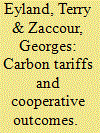

|
|
|
|
|
| Publication |
2014.
|
| Summary/Abstract |
In the absence of an international environmental agreement (IEA) on climate change, a country may be reluctant to unilaterally implement environmental actions, as this may lead to the relocation of firms to other, lax-on-pollution countries. To avoid this problem, while still taking care of the environment, a country may impose a carbon tariff that adjusts for the differences between its own carbon tax and the other country's tax. We consider two countries with a representative firm in each one, and characterize and contrast the equilibrium strategies and outcomes in three scenarios. In the first (benchmark) scenario, in a first stage the regulators in the two countries determine the carbon taxes noncooperatively, and in a second stage, the firms compete à la Cournot. In the second scenario, the regulators cooperate in determining the carbon taxes, while the firms still play a noncooperative Cournot game. In the third scenario, we add another player, e.g., the World Trade Organization, which announced a border tax in a prior stage; the game is then played as in the first scenario. Our two major results are (i) a border-tax adjustment (BTA) mimics quite well the cooperative solution in setting the carbon taxes as in scenario two. This means that a BTA may be a way around the lack of enthusiasm for an IEA. (ii) All of our simulations show that a partial correction of the difference in taxes is sufficient to maximize total welfare. In short, the conclusion is that a BTA may be used as a credible threat to achieve an outcome that is very close to the cooperative outcome.
|
|
|
|
|
|
|
|
|
|
|
|
|
|
|
|
| 12 |
ID:
100958
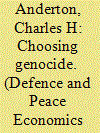

|
|
|
|
|
| Publication |
2010.
|
| Summary/Abstract |
An economic theory of genocide is presented with application to Rwanda-1994. The theory considers 'macro' conditions under which an authority group chooses genocide and 'micro' conditions that facilitate the spread of genocide. From the macro perspective, a bargaining model highlights four rational explanations for an authority's choice of genocide: prevention of loss of power, indivisibility, elimination of a persistent rival, and political bias. From the micro perspective, an evolutionary game model shows how supporters of genocide gain the upper hand in group dynamics over resisters and bystanders. The theory and application suggest that the conditions for genocide are not exceptional.
|
|
|
|
|
|
|
|
|
|
|
|
|
|
|
|
| 13 |
ID:
144797


|
|
|
|
|
| Summary/Abstract |
We present a new theory of interstate crisis bargaining. A country’s resolve is a function of intrinsic qualities of the government and external circumstances, both of which are unknown by the domestic electorate and the foreign country. When domestic political debate reveals that circumstances favor the use of force, the government can extract better terms than if circumstances are revealed to be unfavorable. The revelation of circumstances, however, exacerbates reputational incentives. Because governments can no longer hide behind unknown circumstances, voters can better discern the government’s type from its actions, strengthening the incentives to appear resolved. The model bridges the gap between audience costs and its critiques, showing how domestic audiences punish leaders for inappropriate policies rather than empty threats. At the same time, it highlights how the prospects for peace are worse if uncertainty about the circumstances is removed, suggesting that greater transparency does not always promote peaceful outcomes.
|
|
|
|
|
|
|
|
|
|
|
|
|
|
|
|
| 14 |
ID:
102409
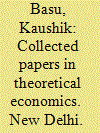

|
|
|
|
|
| Publication |
New Delhi, Oxford University Press, 2005.
|
| Description |
4 V; p.
|
| Contents |
Vol. 1: Development, markets, and institutions
Vol. 2: Rationality, games, and strategic behaviour
Vol. 3: Welfare, law, and globalization
Vol. 4: Inter-disciplinary transgressions : political economy, moral philosophy, and economic sociology
|
| Standard Number |
9780195667615, hbk
|
|
|
|
|
|
|
|
|
|
|
|
Copies: C:4/I:0,R:4,Q:0
Circulation
| Accession# | Call# | Current Location | Status | Policy | Location |
| 055873 | 330.015193/BAS 055873 | Main | On Shelf | Reference books | |
| 055874 | 330.015193/BAS 055874 | Main | On Shelf | Reference books | |
| 055875 | 330.015193/BAS 055875 | Main | On Shelf | Reference books | |
| 055876 | 330.015193/BAS 055876 | Main | On Shelf | Reference books | |
|
|
|
|
| 15 |
ID:
112859
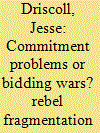

|
|
|
|
|
| Publication |
2012.
|
| Summary/Abstract |
After highly fragmented civil wars, order is often secured through the selective co-optation of rebel field commanders and atomized insurgents. This paper presents a formal model of civil war settlement as a coalition formation game between various regime and rebel factions. This approach emphasizes the ability of installed civilian rulers to lure warlords into the state based on promises of future wealth, then use divide-and-rule tactics to pit different warlord factions against one another. Quantitative and qualitative data from Tajikistan, including an original data set of warlord incorporation and regime purges during wartime reconstruction, are used to evaluate the model.
|
|
|
|
|
|
|
|
|
|
|
|
|
|
|
|
| 16 |
ID:
153062
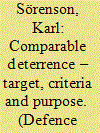

|
|
|
|
|
| Summary/Abstract |
The last decade has seen several advances in the study of deterrence. These advances have sparked some strong disagreements regarding interpretation of the models and what their contributions signify. This paper appraises the discussions from a model theoretic perspective. It is argued that when comparing rivalling models three aspects; (i) target, (ii) criteria and (iii) type of purpose should be taken into account in order to make a proper appraisal. Informed by these aspects it is evident that the three deterrence models analysed address different aspects, in different ways and to different ends. From this perspective, the so-called Perfect Deterrence model must be recognised as a clear advancement in the research field. Model comparison will always be context relative and a plurality of models should be viewed favourably.
|
|
|
|
|
|
|
|
|
|
|
|
|
|
|
|
| 17 |
ID:
186328
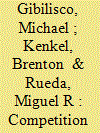

|
|
|
|
|
| Summary/Abstract |
Violence against civilians in civil war is widely thought of as a strategic choice by combatant groups. We argue that a common strategic logic of competition underlies diverse theories of civilian victimization. We develop a theory of strategic complements in victimization, hypothesizing that an armed group’s propensity to victimize civilians will increase with its expectation that its competitors will act likewise. We test this argument by structurally estimating a formal model of strategic interdependence between armed groups using data from the Colombian civil war. Our findings indicate that strategic expectations are responsible for a substantial amount of violence against civilians: the two major combatant groups would have systematically victimized civilians in at least 9% fewer municipalities if they had expected no violence by their rival. Examining causal mechanisms, we also find that victimization in the Colombian case was more likely aimed at controlling civilians than at influencing peace negotiations.
|
|
|
|
|
|
|
|
|
|
|
|
|
|
|
|
| 18 |
ID:
029316
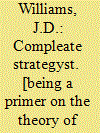

|
|
|
|
|
| Edition |
Rev. Ed.
|
| Publication |
New York, Mc Graw Hill Book Company., 1966.
|
| Description |
xi, 268p.
|
|
|
|
|
|
|
|
|
|
|
|
Copies: C:1/I:0,R:0,Q:0
Circulation
| Accession# | Call# | Current Location | Status | Policy | Location |
| 002388 | 519.3/WIL 002388 | Main | On Shelf | General | |
|
|
|
|
| 19 |
ID:
091670
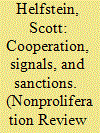

|
|
|
|
|
| Publication |
2009.
|
| Summary/Abstract |
This paper uses game theory and modeling to address the role of incentive structures and information dynamics in nuclear inspections. The traditional argument is that compliant states should be willing to allow inspections to prove their innocence, while proliferating states are likely to impede inspections. This argument does not take into account the historical variation in inspection, signaling, and sanctioning behaviors. Using a game theoretic analysis and model, it is shown that the separation of proliferators from nonproliferators only occurs when the likelihood of proliferation is high and punishment costs are moderate. The model assumes that states can choose how much to cooperate with inspectors and must pay opportunity or secrecy costs when inspections are effective. The results are tested against a set of real-life cases, providing support for the claims of historical variation and the model's deductive propositions
|
|
|
|
|
|
|
|
|
|
|
|
|
|
|
|
| 20 |
ID:
150996
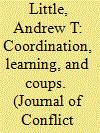

|
|
|
|
|
| Summary/Abstract |
This article proposes a theory of coups that centers around coordination and learning. The military is modeled as many officers who only want to join a coup if others join as well (i.e., coordination). If the current regime has survived past coup attempts, it is common knowledge that it is relatively strong (i.e., learning). Combining these effects, once the regime survives the first period, officers know that the regime is strong enough that they may refrain from staging a coup—regardless of how dissatisfied they may become with the status quo—under the mutually enforcing expectation that no other officer will rebel. The model has other equilibria where coup attempts can occur after the first period, allowing for more detailed empirical predictions. The analysis highlights several reasons why new regimes are prone to coups, but among regimes surviving the initial turmoil, structural factors that would seem to predict coup attempts can have an ambiguous effect. The model also makes novel predictions about how the “initial conditions” of a regime as well as what kinds of changes to payoffs affect the likelihood of coups.
|
|
|
|
|
|
|
|
|
|
|
|
|
|
|
|
|
|
|
|
|